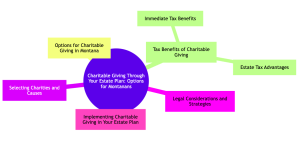Charitable giving within estate planning offers Montanans a powerful way to create a lasting legacy that extends beyond their lifetime. This approach reflects personal values and philanthropic goals and provides significant financial benefits. By integrating charitable donations into estate plans, Montanans can ensure their legacy makes a meaningful impact while confidently navigating the legal landscape.
Key Takeaways
- Recent Montana legislation introduces changes affecting estate planning and charitable giving.
- Various methods exist for incorporating charitable donations into your estate plan.
- Charitable giving in estate planning comes with notable tax benefits.
- Selecting charities that align with your personal values and goals is crucial.
- Legal assistance is key in crafting effective charitable giving strategies within estate plans.

Understanding Charitable Giving in Estate Planning
Charitable giving is a multifaceted aspect of estate planning that allows individuals to support causes close to their hearts while reaping emotional and financial rewards. This strategic approach ensures your philanthropic goals are met and offers tax advantages, potentially reducing estate tax liabilities and providing income tax deductions. The impact of such giving extends beyond immediate financial benefits, fostering a legacy of generosity and community support.
Benefits of Charitable Giving Options
| Method of Giving | Emotional Benefit | Financial Benefit | Impact on Legacy |
| Direct Bequests | Simplifies giving process | Potential estate tax reduction | Direct impact on chosen cause |
| Charitable Trusts | Long-term support for causes | Income tax deductions, reduced estate taxes | Sustained support over time |
| Donor-Advised Funds | Flexible giving options | Immediate tax deduction for contributions | Influence over fund allocation |
| Life Insurance Policies | Large impact with minimal cost | Estate tax exemption for donated policies | Significant funding for causes |
| Retirement Accounts | Avoids income and estate taxes on distributions | A tax-efficient way to donate | Full account value goes to charity |
Options for Charitable Giving in Montana
Montanans have several avenues to incorporate charitable giving into their estate plans, each offering unique benefits and considerations. From direct bequests to more structured approaches like trusts and funds, these options allow individuals to tailor their philanthropic impact according to their personal and financial goals.
- Direct Bequests: Straightforward – direct bequests involve leaving a specific amount of money or a percentage of your estate to a charity in your will.
- Charitable Trusts: These trusts offer flexibility and tax benefits, allowing you to set aside assets for charity while potentially providing income to you or your heirs.
- Donor-Advised Funds: Donor-advised funds are an effective tool for those seeking an immediate tax deduction with the ability to recommend grants over time.
Tax Benefits of Charitable Giving
Immediate Tax Benefits
Charitable donations can offer immediate tax benefits, particularly in the form of income tax deductions. When you make a charitable donation during your lifetime, you may be eligible to deduct that amount from your taxable income, reducing your overall tax burden for the year. (1)
Estate Tax Advantages
Charitable giving can also play a strategic role in reducing estate tax liabilities. By allocating part of your estate to charity, the value of your taxable estate decreases. This can be particularly advantageous under Montana’s tax laws and federal estate tax considerations, potentially saving significant amounts in taxes that the estate would otherwise owe.
Selecting Charities and Causes
Choosing the right charity is a deeply personal decision that reflects your values and the impact you wish to make. It’s essential to research and select organizations that align with your philanthropic goals and have a track record of effective and responsible use of donations.
Factors to Consider When Choosing a Charity
| Charity Type | Mission Alignment | Impact | Transparency |
| Local Charities | High if local issues matter to you | Direct impact on the community | Varies; look for clear reporting |
| National Organizations | Depends on the cause | Broad reach; potential for significant change | Generally high; often have detailed annual reports |
| Issue-Specific Charities | High if they address causes you care about | Focused impact on specific issues | Check for effectiveness and efficiency in using donations |
Legal Considerations and Strategies
When weaving charitable giving into your estate plan in Montana, it’s crucial to navigate the legal landscape carefully. This ensures your generosity hits the mark, supporting your chosen causes in line with both your wishes and the law.
- Consult with an Estate Planning Attorney: Start by consulting a legal expert familiar with Montana’s estate planning laws to tailor your plan to your charitable goals.
- Choose the Right Charitable Giving Vehicle: Decide whether direct bequests, charitable trusts, or donor-advised funds best suit your estate and philanthropic objectives.
- Understand the Tax Implications: Work with your attorney to understand how your charitable contributions will impact estate and income taxes, maximizing the benefits for you and the recipient organizations.
- Clearly Document Your Wishes: Ensure your intentions are clearly documented in your will or trust, specifying the organizations and the amounts or percentages they will receive.
- Regularly Review and Update Your Plan: As laws change and your personal circumstances evolve, periodically review and update your estate plan to ensure it remains aligned with your charitable giving goals.
Implementing Charitable Giving in Your Estate Plan
Incorporating charitable giving into your estate plan involves several key steps, from the initial drafting of documents to the final registration with state agencies. The complexity of this process can vary significantly depending on the method of giving you choose.
Comparison of Charitable Giving Methods
| Giving Method | Process Complexity | Documentation Needed | Potential Impact |
| Direct Bequests | Simple | Will or Trust Document | Direct, specified impact |
| Charitable Trusts | Moderate to High | Trust Agreement, Tax Filings | Sustained support, tax benefits |
| Donor-Advised Funds | Moderate | Fund Agreement, Beneficiary Designations | Flexible, ongoing contributions |
Wrapping Up
Integrating charitable giving into estate plans allows Montanans to extend their legacy and make a lasting difference. This strategy transforms personal values into impactful actions, ensuring your contributions continue to benefit causes important to you long after you’re gone. Crafting a plan that aligns with both your philanthropic goals and legal requirements is critical to making your vision a reality.
Montana Elder Law stands as a trusted partner in this journey. Their deep understanding of estate planning and charitable giving ensures your intentions are realized with precision. Partnering with them means your charitable goals are met with expertise, providing a seamless blend of legal savvy and personal commitment to the causes you care about. Their guidance is invaluable for anyone looking to make a meaningful impact through their estate.
Visit Montana Elder Law’s HOMEPAGE for more resources.
References:
(1) Estate Planning Publications, Montana State University, https://www.montana.edu/estateplanning/eppublications.html




